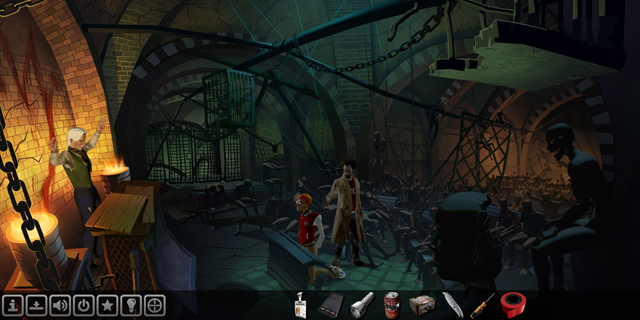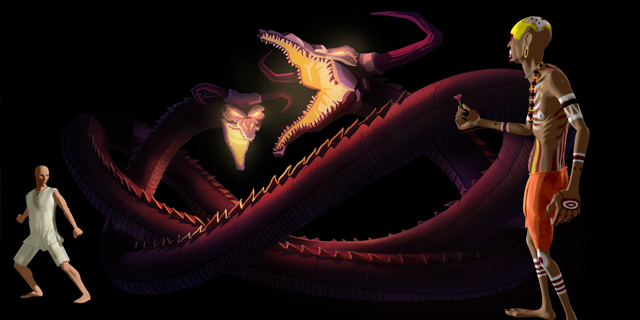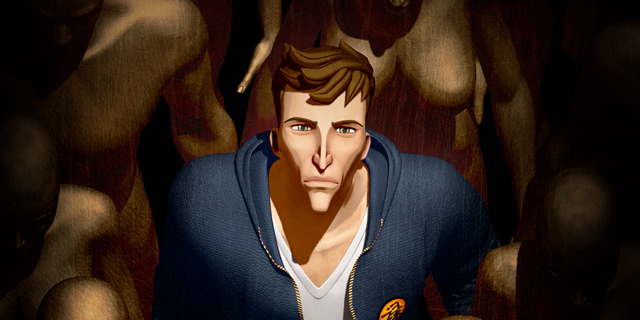Adventure games figured out a gameplay formula that worked and pretty much stuck with it. As gamers became accustomed to faster and more engaging games, many from genres that repurposed adventure game attributes for their own means, the genre failed to adapt and instead died. Well, not entirely. Some came out once in a while, then Telltale started to make the genre popular again, and now with indie titles and Double Fine’s Kickstarter experiment, they’re finally entering the mainstream once more. So it’s more like adventure games were in a coma.
As the genre groggily lurched out of this coma, some companies actually experimented with the formula to make their games feel more contemporary. Telltale took the 3D environments and controls from Grim Fandango and expanded on those ideas for a more immersive experience, with new camera controls and better movement. The limited movement in 2D adventure titles allowed artists to spend more time on small sections of the game to make the graphics look even better than a lot of big budget 3D games. And Pendulo Games, rather than reinventing the wheel, made it more efficient by cutting out some of the bullcrap.
When bums are being torched alive, no one takes action except Henry White, the heir to one of America’s largest fortunes. He’s taken hostage by the leader of a homeless cult, and stumbles upon a much bigger story than some hobos catching on fire. Telling you anything past that would be a spoiler, as the twists and turns come fast in this short title. As I said before, this game really cuts out the bullcrap. It has as much content as some of the most well-known adventure games, but through the use of new mechanics like a hotspot indicator, Yesterday eliminates a lot of the time-wasting chaff. Some of this is a big help, but other bits just kind of annoyed me.

On the good side, there’s that hotspot indicator I mentioned. Clicking it will cause all the clickable areas on the screen to blink for a second, taking care of any annoying pixel hunting. The game’s hint system is much more intuitive than what we’ve seen from other adventure game devs. The hints are never super obvious, but actually help. Both of these mechanics have a short cooldown time to keep the player from abusing them. Some of the controls take a bit of getting used to. Rather than clicking “use”, then an item, then the item on which you’d like to use it, the player can just drag things on top of each other. Once I warmed up to this, it made me wish people had thought of it much sooner.
But some stuff I like gets cut out as well. When something across the screen is clicked, rather than waiting for your character to walk all the way across the screen he will disappear and reappear at his destination. This serves its purpose, and ultimately saves a lot of time, but kind of ruined my immersion at some parts. And as great as the hint system is, it makes the already-pretty-easy puzzles even easier. Most of the solutions are pretty obvious, using really specific tools for the job, and there isn’t much of a consequence to using the hints. Other than the slightly trite “keep clicking on things until they do something” solution, there are some multiple choice questions. Story-wise, there should be grave repercussions to a wrong answer, but I got plenty of them wrong and not much happened. In fact, nothing happened. Sometimes it felt like Pendulo just wanted to move things along. And frankly, I was okay with that, as the story is totally engaging.

With all these cuts to the classic game formula without adding much back into the equation, Yesterday clocks in at just over a couple hours on your first play. It’s a great couple hours, but the $30 pricepoint seems a little steep for it. If Yesterday goes on sale, definitely snatch it up. Otherwise, it’s totally fine to wait, as nothing about it is screaming to be played right now.
Pros: Fresh take on the mechanics of classic adventure games, engaging and dark story that retains its sense of humor
Cons: Steep price for the length, might cut out just a bit too much




















